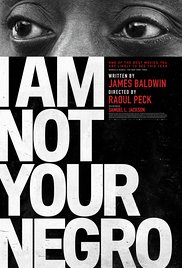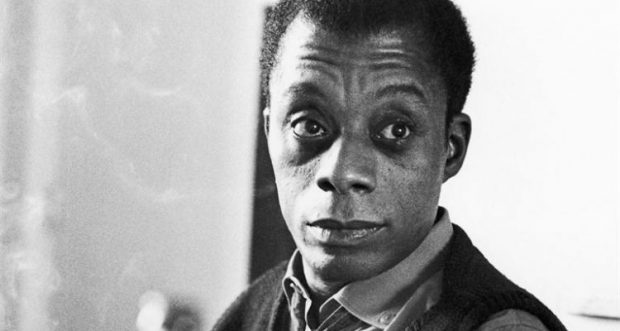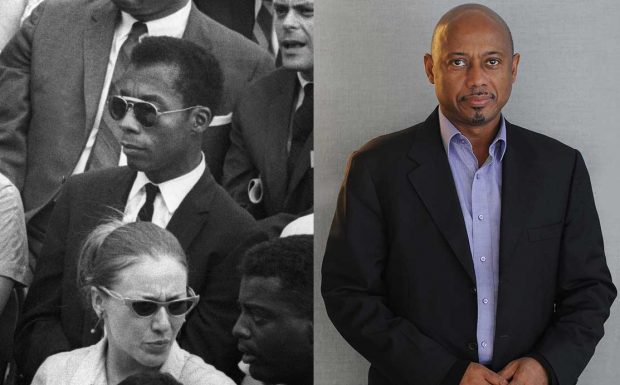I AM NOT YOUR NEGRO
“I can’t be a pessimist because I’m alive. I’m forced to be an optimist.”
James Baldwin
“I Am Not Your Negro”, directed by Raoul Peck and narrated by Samuel L. Jackson, is a revolutionary film based on activist James Baldwin’s unfinished book Remember This House. It explores the reality of racism and its’ devastating effects and repercussions on America through his recollection of civil rights leaders Malcolm X, Medgar Evers and Martin Luther King, Jr.
 This Oscar nominated documentary will cause America to question how far we have come as a nation regarding race relations, past and present. Although Baldwin died nearly 30 years ago, his words are as relevant today as they were in the 60’s and 70’s. One would have to question if he could see how the past, present, and future of the radical, racial divide in these United States would manifest itself and ultimately stunt its’ growth.
This Oscar nominated documentary will cause America to question how far we have come as a nation regarding race relations, past and present. Although Baldwin died nearly 30 years ago, his words are as relevant today as they were in the 60’s and 70’s. One would have to question if he could see how the past, present, and future of the radical, racial divide in these United States would manifest itself and ultimately stunt its’ growth.
Raoul Peck says he never set out to make a documentary of his view of James Baldwin, but to let Baldwin speak for himself in his own words, ultimately telling his own story through his own eyes. He so fluidly gives his viewpoint of the juxtaposition between white and black America: “I’m sure they have nothing against Negroes [but] that’s really not the question,” Baldwin says. “The question is really a kind of apathy and ignorance.”
To call “I Am Not Your Negro” a movie about James Baldwin would be an understatement. It’s more of a posthumous collaboration between the filmmaker and his subject. The voice-over narration (read by Samuel L. Jackson) is entirely taken from Baldwin’s actual work. Much of it comes from notes and letters written in the mid 1970s, when Baldwin was working on a book he never completed about the lives and deaths of Medgar Evers, Malcolm X and Martin Luther King Jr.
Ironically, Baldwin’s words so often seem to speak directly about Ferguson, Black Lives Matter, the presidency of Barack Obama and the resurgence of white nationalism in its wake. It seems as if Baldwin foresaw and somehow predicted it all.
Scenes from “Guess Who’s Coming to Dinner?” and other old Hollywood films featured alongside footage and photos from the Watts riots, the Ferguson uprising and assassinations of Martin Luther King Jr. and Malcolm X. Those scenes, framed by Baldwin’s words, show audiences the many faces of structural racism that Baldwin understood as connected when he wrote them back in the ’80s.
Peck confesses, “I Am Not Your Negro” is the result of my own anger about the ignorance that exists today, and how we ignore how important Baldwin is. Baldwin talks about television and the entertainment industry as something similar to the use of narcotics. He wrote that 40 years ago, and we see how intense it is now. When you watch reality TV, it has nothing to do with reality.”
Taking his perspective back to the images he saw as a child, Peck says he now realizes how they shaped his perception of who he is.”When I was a young boy in Haiti, I would watch American films. I remember seeing “Guess Who’s Coming to Dinner?” and feeling very proud because I could, at last, see a handsome Black man who speaks English well, is an intellectual and even gets the White girl. But at some point, I felt something was wrong. At the time, I couldn’t exactly put my finger on it. But Baldwin opened up and explained that they were using Sidney against us and making him something we, the majority, could never be. They set the bar very high and said, if you can’t be Sidney, stay in your ghetto. Baldwin helped us deconstruct the whole Hollywood creator of the Black image. Film and images are not innocent. There are many layers delivered in those beautiful law, adventure, sci-fi and horror stories. They bring things that prevent you from understanding who you really are.”
“I Am Not Your Negro” is an introspective introduction to James Baldwin and his extraordinary work. If you’ve never heard of him, seek him out. There are countless archives in print, on tape, and on film for those who wish to gain additional knowledge and insight into this literary genius. Discovering James Baldwin is to take a remedial course in American history, and to obtain a doctorate in racial politics. This documentary in my opinion should be required viewing for any and everyone who wishes to gain insight into America’s past and present racial divide. Perhaps “I Am Not Your Negro”, will answer some age old questions, while shedding light on an often dim history that we seem so close to repeating.
“I want to be an honest man and a good writer,” Baldwin wrote early in his career, in his first collection of essays, “Notes of a Native Son.” I would say effectively accomplished that, and so much more.
Darryl Rembert








